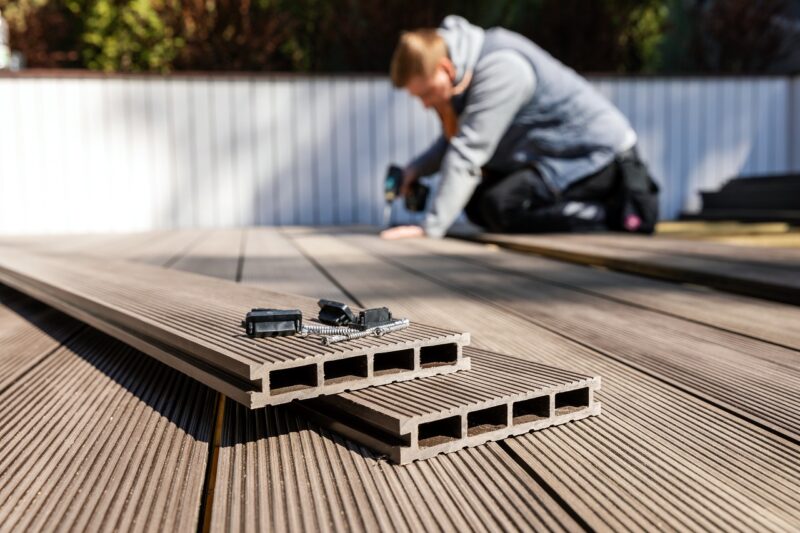Published: 06/11/23 By: Mike Bekin
When adding decking to your garden, wood is always the obvious choice. But should you go for a completely natural timber or a contemporary composite? Both bring different benefits and can affect the look of your outdoor space, and we recommend weighing up the pros and cons of each before you make a decision. To help you out, we have put together everything you need to know.
Aesthetics and Style
Natural timber is the traditional, timeless choice for your decking. Adding a warm look to your space, it definitely has a more premium aesthetic and will blend beautifully with a natural surrounding. The different timber species available and the opportunity to stain and oil your wood provide plenty of versatility, too.
Composite decking mimics the natural look of timber but does not quite achieve the same feel, finish and properties. Many people prefer the authentic look of natural timber decking to composite decking.
Durability and Maintenance
Not all timber species are created equal, and for decking you have to choose a durable, strong species which will withstand wear and tear, We recommend:
- Ipe
- Cumaru
- Jatoba
- Opepe
- Massaranduba
As long as you opt for the right species, your natural decking should be able to function with ease outdoors for many years to come. It will need maintenance to stay in good shape, though, and we recommend regular cleaning and – depending on the species – yearly preservation treatments such as oil if you want your decking to continue to look the part. Without care, your natural timber will go grey and may even become more susceptible to rot and infestation, neither of which is going to help its lifespan.
Composite decking, on the other hand, needs a lot less maintenance. It is not as durable but it doesn’t need to be treated, making it ideal for those who want decking which does not need much upkeep.
Colour Fastness
It is important to note that natural timber can see discolouration when used outdoors. Suna dn rain, also known as weathering, will turn any timber to a silver-grey colour, which though beautiful to many, might not be what you had in mind. To maintain the shade of your timber, you will need to stain and oil it as part of your yearly maintenance treatments.
Composite decking definitely wins points for its colour fastness. As it comes in a range of stylish colours which will stay bright and clear over the years, fading only slightly without completely losing the original shade, it is the perfect choice if you want the colour to remain fast.
Environmental Impact
When sourcing timber decking from EcoChoice, you will be opting for sustainable timber from responsibly managed forests. This gives your project plenty of eco-friendly points! As a natural, biodegradable building material, it is a wonderful option for minimising the impact of your decking on the planet.
Composite decking, on the other hand, contains plastic. This gives it a higher environmental impact than natural timber. However, at EcoChoice we minimise the impact by only using certified recycled plastic in our WPC decking.
Overall Conclusion
Both composite decking and natural timber decking are fantastic options for creating a more usable garden. If you prefer a natural, rustic look and do not mind putting in some elbow grease, we would always recommend timber. For a low-maintenance, durable option, opt for composite decking made with recycled plastic.
If you are still not sure which is the right option for your project, get in touch with our team at EcoChoice. As decking experts, we are always ready to help!
Image: ronstik / Shutterstock.com
